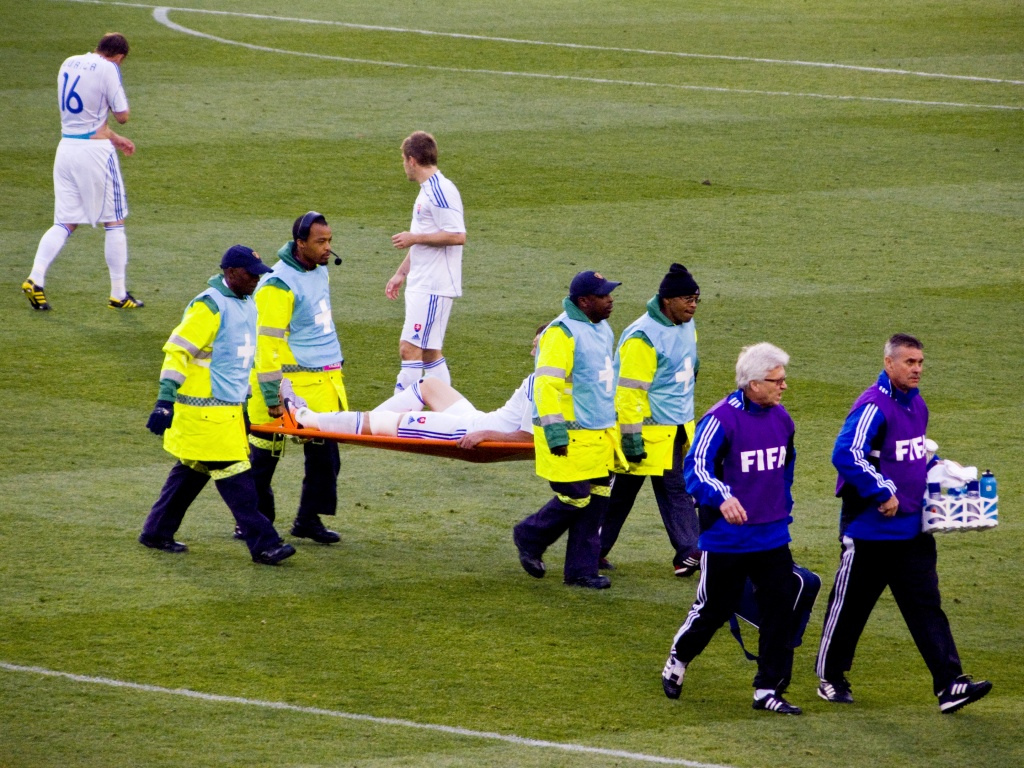 Soccer Injury, Aquila, FlickrIf this seems like a simple topic, forgive my naivete. But I believe this is a very critical distinction to make and one that I failed to for a long time. This distinction is important because it can define how you are treated by medical providers and in turn dictate how you perceive it your injury/condition.
Soccer Injury, Aquila, FlickrIf this seems like a simple topic, forgive my naivete. But I believe this is a very critical distinction to make and one that I failed to for a long time. This distinction is important because it can define how you are treated by medical providers and in turn dictate how you perceive it your injury/condition.
Chronic pain/injury/disease is something the progresses slowly, develops over time, and becomes a systemic issue often gathering momentum as it progresses. The cause and effect relationship is generally unclear.
Acute pain/injury/disease is something that has a rapid onset, short duration and often times (but not always) a result of a specific impact or traumatic event to the body. The cause and effect relationship is generally pretty clear.
These are generalizations of course, and there is much more nuance to be had. But for me, getting to these basic classifications more quickly would have gone a long way.
As an 18 year old I was injured playing soccer when I collided with a goalkeeper. To spare you the melodramatic details the end result was a trip to the Emergency Room, a referral to an Orthopaedic Doctor and a little physical therapy. There were some mumblings about hyperextension, cervicalgia, and contusions but nothing definitive. I was supposed to be fine. Nothing was broken or dislocated and plus I was 18, an athlete and in the prime of my health.
Unfortunately this has not been the case. I write this seven years later with much worse pain than at initial onset and an unclear future. But one thing I see looking backward is a fundamental misunderstanding of chronic vs acute pain.
For years I pursued treatments that were more appropriate for acute problems. I told people that this specific injury was the source of my problems. I saw the same chiropractors and therapists over and over. I wondered why I wasn’t healing. I blamed myself for not healing. I wondered how such an innocuous seeming injury could be so devastating. And I went in circles.
Now maybe I would have either way. But I do think that a considerable amount of time and energy was wasted on the wrong treatments and incorrect methods of thought. I now think of my problem as something that preexisted the “injury” and the “injury” simply gave an opportunity for the problem to manifest. I don’t advocate that everyone run out and demand some type of a diagnosis and throw around somewhat arbitrary terms like “chronic”. But a clear understanding of an injury or a medical condition is imperative.
My advice? Do a lot of research, don’t accept everything a doctor tells you, advocate for yourself, get multiple opinions, stay positive and most of all listen to your body.
Which brings me full circle to writing for Hurt.com. I am writing not from the perspective of an expert or someone with all the answers. If I had some type of panacea I would gladly give it to all of you, right now. Sadly I don’t have a panacea. I am simply someone who’s been through a lot and wants to share in the hope that my experiences can help others.
-Colin
 Wednesday, March 30, 2011 at 12:01AM
Wednesday, March 30, 2011 at 12:01AM  Colin from Portland has written a very nice article on the differentiation between acute pain and chronic pain today on Hurt.com Here is a link to the article: Acute Pain vs. Chronic Pain.
Colin from Portland has written a very nice article on the differentiation between acute pain and chronic pain today on Hurt.com Here is a link to the article: Acute Pain vs. Chronic Pain.  Acute Pain,
Acute Pain,  Chronic Pain,
Chronic Pain,  surgery in
surgery in  depression,
depression,  surgery
surgery 